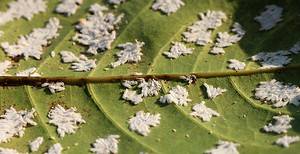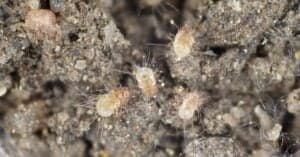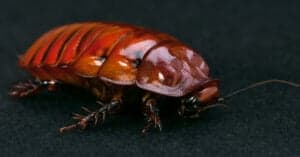The Neem tree is well-known in the world of alternative medicine for its many uses in treating various conditions. This tree’s bark, leaves, and seeds are used to make different medicine types. However, another derivative of the neem tree has found application in the agricultural world as a pesticide for different types of insect bugs. You’ve probably been told how effective neem oil is for getting rid of various bugs and insects.
But does neem oil work to get rid of aphids? Is there a basis for such claims, and how does it work? Read on to find out.
Does Neem Oil Work To Get Rid Of Aphids?
First things first: Does Neem Oil Work To Get Rid of Aphids? Yes. Neem oil does kill aphids. Many farmers and gardeners who have used this oil can confirm that it is an effective alternative treatment for Aphids and other insect pests. Numerous scientific studies have been carried out in that regard as well.
Not only is Neem oil effective, but it is also quite safe to use. Unlike regular chemical pesticides, neem oil does not affect beneficial insects in the garden, such as ladybugs, or pollinators (such as butterflies and earthworms in the soil. This makes it a great choice for people who want to combine its usage with the biological control of aphids using natural enemies like ladybugs.
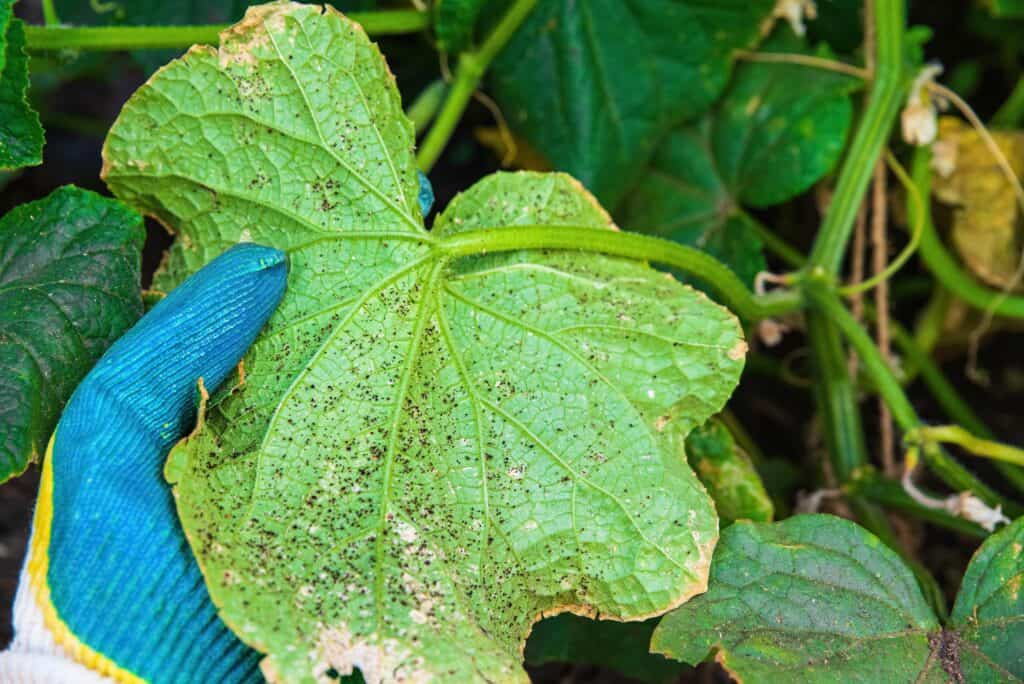
Farmers have successfully used neem oil to repel or kill aphids.
©EVGEIIA/Shutterstock.com
What Is Neem Seed Oil?
For clarity, Neem seed oil or neem oil is a type of vegetable oil derived from the seeds of the neem tree plant (Azadirachta indica). Although this tree is native to India, it is found in many other countries all over the world.
Raw neem oil contains a compound known as azadirachtin, a natural pesticide that can kill various insect pests. It also acts as a fungicide and miticide for plants. You can use neem oil on indoor houseplants as well as outdoor gardens. Many chemical insecticides also contain neem oil as an ingredient along with other insect repellent oils or are added to fertilizers for soil amendment.
How Does Neem Oil Kill Aphids?
Neem oil kills aphids by smothering them. When the oil comes in contact with the aphids, it blocks their ability to breathe, leading to suffocation within a short time. Also, the compound azadirachtin, which is an active ingredient in neem oil, blocks the insects from feeding on plant leaves.
In addition to aphids, Neem oil can be used as a pesticide against other insect pests as well, including mealybugs, leafhoppers, mealybugs, and whiteflies. You can also use the oil to treat the soil for nematodes and get rid of garden mites. Neem oil has antifungal properties, making it effective for treating fungal diseases in plants, such as powdery mildew, black spot, scab, leaf spot, and so on.
When To Use Neem Oil On Plants
Gardeners use Neem oil as a preventive measure against pests or as a pesticide to treat ongoing cases of insect infestation. The oil is typically applied during the cool periods of the day, such as in the morning or evening hours.
Neem oil should not be applied to plants during the day when the sun is hot in the skies. The oil reacts with sunlight, and it can burn the plants. You can use the oil at any time during the growing seasons since it effectively kills pests at all stages in their lifecycle.
Does Neem Oil Work To Get Rid Of Aphids When Used As Spray?
Many commercial oil sprays contain a hydrophobic form of neem oil as one of their constituents. However, the azadirachtin in these sprays is typically removed during processing. Still, the oil is quite potent and can kill all aphid species in contact with their body by blocking their breathing holes. Gardeners often use foliar spray for spot treatment of indoor plants. They’re considered safe to use indoors because of how quickly they evaporate. The oil also doesn’t leave any residue on the plant surface.
How To Make Neem Oil Sprays
Neem oil sprays are available commercially. However, you could also prepare your own Neem oil spray mixture at home for your garden. The materials you’ll need for a DIY spray include:
- Cold-pressed neem oil
- Liquid soap
- A gallon of water
- Spray bottle
Follow these steps to prepare your spray mixture:
- Mix water with a small amount of liquid soap or insecticide (about a teaspoon). This acts as an emulsifier for your spray mixture
- Add about one or two tablespoons of pure neem oil to the mixture.
- Pour your neem oil mixture into a spray bottle. Before you apply the spray to the entire plant, test it on a small section of the plant. Some plants are sensitive, and homemade sprays like this can damage them. Observe the plant for 24 hours. If there’s no sign of damage, you can proceed to mist your plant with the spray.
Note that you can reapply neem oil as many times as possible. As a preventive measure for pests, you can spray plants biweekly. However, if there’s an active pest infestation, you should spray the plant at least once weekly.
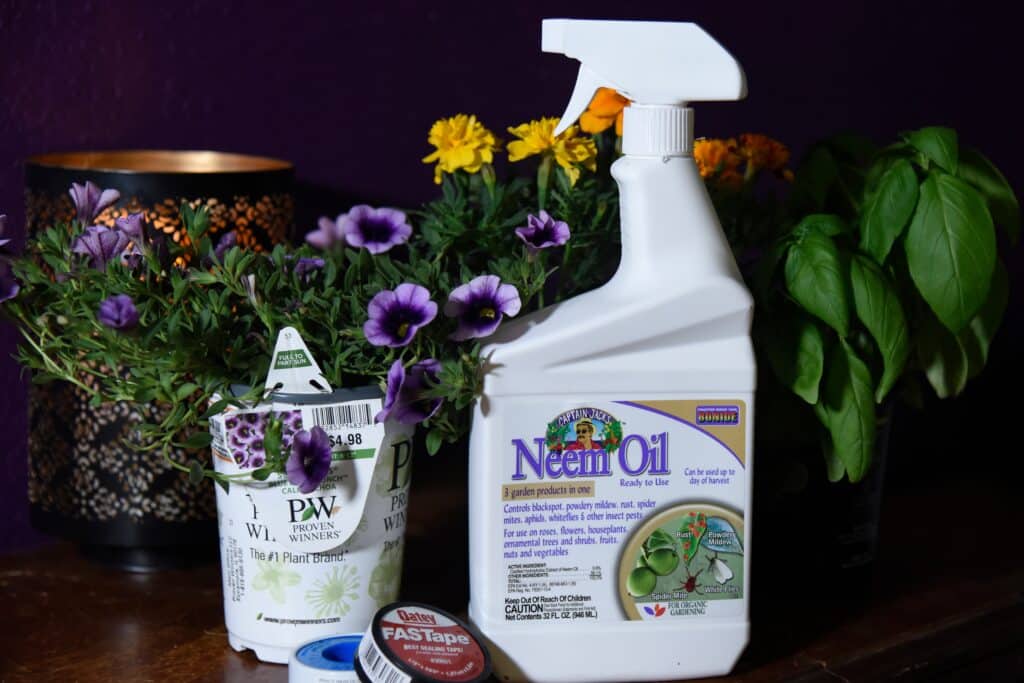
Neem oil spray is easy to make and can also be bought commercially from a number of retailers.
©Wild As Light/Shutterstock.com
Does Neem Oil Work To Get Rid Of Aphids When Used As Soil Soak?
Although the more popular form of neem oil insecticide is in spray form, Neem oil can also be made into a soil soak. For this, you should use raw neem oil and not processed ones. It has high Azadirachtin levels, and this chemical disrupts the feeding habits of aphids and several insects. It can also interfere with their growth stages and reproductive cycle.
Neem oil sprays might not be effective on large outdoor plants because the spray has to get on the insect’s body to be effective. In this case, soil soaks would last longer. You also won’t have to apply a soil soak as often as you would need to do with a spray. Neem oil soil soaks are usually applied on a 22-day cycle.
The soak is applied to the soil, and the plant soaks it up. The insect ingests azadirachtin when they pierce the stem or leaves of the plant, poisoning them. This is particularly great since no damage is done to pollinators and other beneficial insects that do not feed on the plant.
How To Make A Neem Oil Soil Soak
The ingredients you’ll need are the same as the spray, i.e. water, neem oil, and soap solution, which acts as an emulsifier.
- Add one teaspoon of the soap solution to a gallon of water and mix thoroughly.
- Add two tablespoons of raw cold-pressed neem oil to the water mixture
- To apply, pour a good quantity of the soak onto the soil around your plant to feed the root. You’ll need about 2-4 cups for your average plant. However, bigger shrubs or trees might require more.
This spray is best applied on a rainless day, so it doesn’t get dispersed before the root of the plant can absorb it. You can repeat the routine every three weeks as a preventative measure for aphids and other insect pests.
How Long Does Neem Oil Take to Kill Aphids?
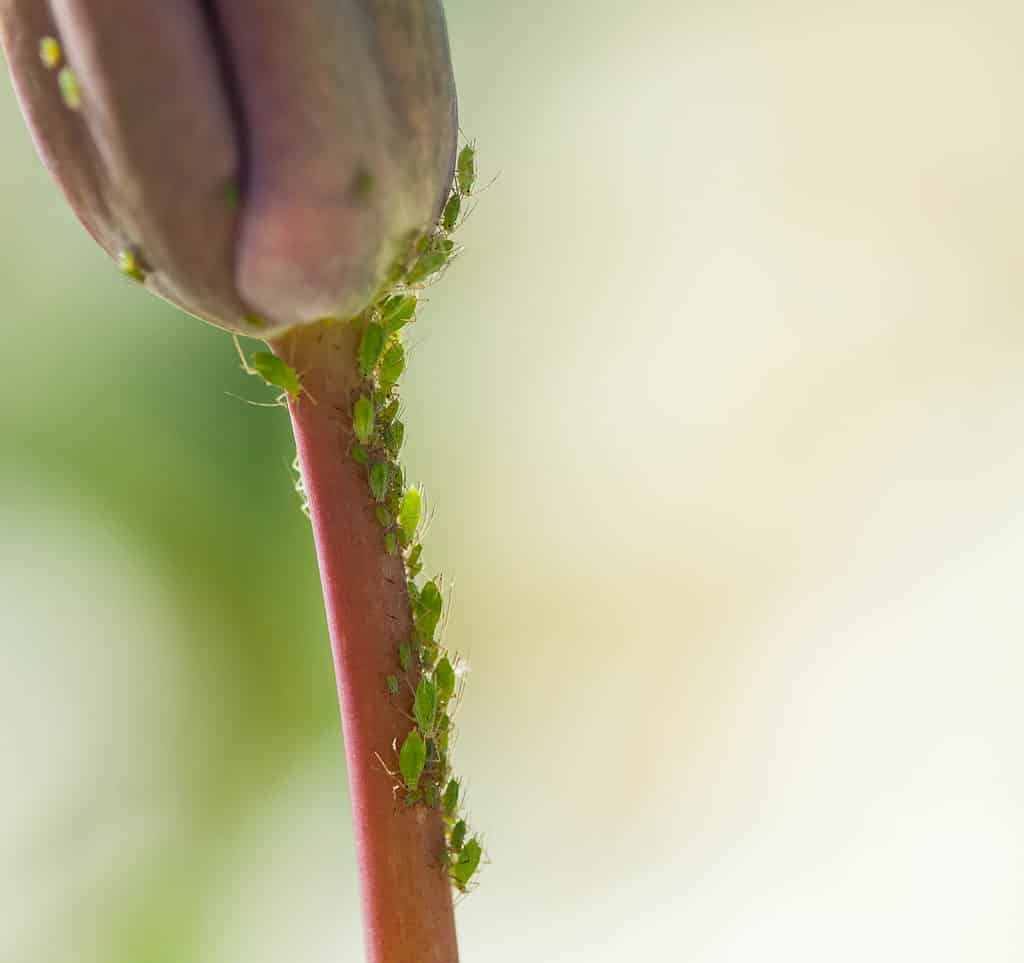
Neem oil will generally take at least two days to be effective, perhaps a bit longer.
©Keattikorn/Shutterstock.com
Neem oil, as well as other applications like horticultural oils and soaps, will kill aphids and if you have an acute infection, it should be applied more frequently, around one or two times per week. If you wish to make sure your plants are not getting overrun with aphids, you should spray neem oil weekly. It will generally take at least two days, possibly more, for you to start seeing the results, with fewer insects appearing and a reduction in damage to your plants.
Weekly applications should help control the infestation. Aphids, as well as other insects, do not develop a resistance to neem oil, and as a result, you will be able to continue applying with effective results. You can also use it during the off-season, when insects are dormant, as future pest control.
Conclusion
So does neem oil work to get rid of aphids? Yes, it does. Not only is neem oil effective for getting rid of aphids. It also works for other insect pests and is completely safe to use in both indoor and outdoor gardens.
The photo featured at the top of this post is © StockImageFactory.com/Shutterstock.com
Thank you for reading! Have some feedback for us? Contact the AZ Animals editorial team.



